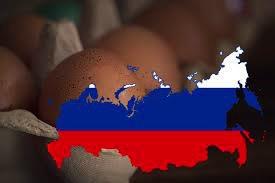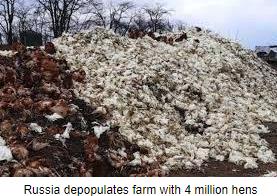 The Russian Union of Poultry producers (Rosptitsesoyuz) has revealed a new policy relating to nationwide vaccination against Highly Pathogenic Avian Influenza (HPAI). Despite application of structural and operational biosecurity, the government-controlled poultry association regards vaccination as a necessary adjunct to existing control and prevention measures.
The Russian Union of Poultry producers (Rosptitsesoyuz) has revealed a new policy relating to nationwide vaccination against Highly Pathogenic Avian Influenza (HPAI). Despite application of structural and operational biosecurity, the government-controlled poultry association regards vaccination as a necessary adjunct to existing control and prevention measures.
An official statement included, “ Poultry farmers cannot protect birds from airborne infection and it is also impossible to prevent rodents infected with the virus from entering production sites and even the spread of feces of infected birds over poultry farms. Poultry farmers cannot control factors outside poultry farms, roadway stations, forest, swamps and other factors that contribute to the spread of the virus.”
It is noteworthy that implicit in the decision by the Russian Poultry Association to “encourage” vaccination is the recognition that HPAI can be disseminated by the aerogenous route and that virus is present in the environment of poultry farms from shedding by migratory and possibly, domestic birds. Although the statement implicates rodents as introducing virus onto farms, it is now recognized that numerous terrestrial mammals are susceptible to infection and could be involved in transmission of infection.
 Russia has made the decision to introduce vaccination, given the high probability of losses that will result from infection introduced into many extremely large, integrated broiler production units located on a single tract of land. Although new facilities have been erected following the pattern of E.U. and U.S. layouts, a number of Communist-era complexes are still functional. These have parent flocks, a hatchery, grow-out and processing all located on a single tract of land, creating an all-or-nothing situation with the high risk of introduction of infection with severe financial consequences.
Russia has made the decision to introduce vaccination, given the high probability of losses that will result from infection introduced into many extremely large, integrated broiler production units located on a single tract of land. Although new facilities have been erected following the pattern of E.U. and U.S. layouts, a number of Communist-era complexes are still functional. These have parent flocks, a hatchery, grow-out and processing all located on a single tract of land, creating an all-or-nothing situation with the high risk of introduction of infection with severe financial consequences.
It is also apparent that Russia recognizes that as HPAI is now endemic, it will be unable to satisfy domestic demand for poultry meat, the principal animal protein applying existing modalities of prevention. This is based on current international sanctions and the need to conserve foreign currency. The Government of the Russian Federation recognizes the inherent principle expounded by Huey Long, Governor of Louisiana during the 1930s, that political stability is dependent on a chicken-in-every-pot. The Government is obviously concerned over potential criticism and anti-war agitation should the comrades be deprived of chicken.